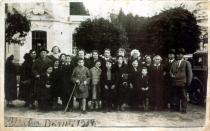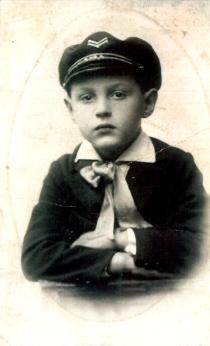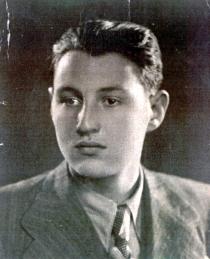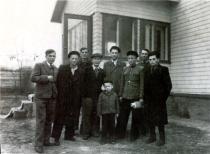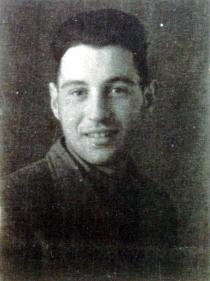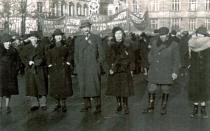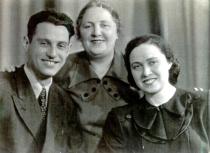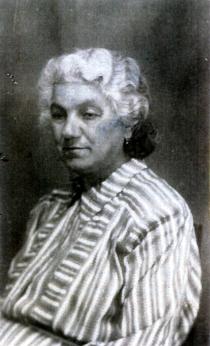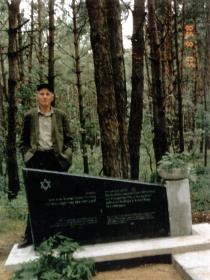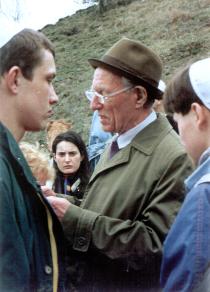This is a picture of the family of my mother Molka Zinger. The photo was taken in Vatra Dornei, Romania in 1932.
Third from right is my grandmother Brucha Zinger (nee Rozenfeld), my grandfather Aaron Zinger is second from left, fourth from right is my aunt Liya Zinger and fifth from right, the tall gray haired woman, is my grandfather's sister Beba Fraiburg (nee Zinger). I don't remember any other relatives in this photo.
My maternal grandfather, Aaron Zinger, was related to Spanish Jews; his ancestors originated from Spain in the Middle Ages. He was born in Kiliya in 1860. My grandfather studied at the Medical Faculty of Vienna University for a few years until his father asked him to follow into his footsteps and continue the family business. He took over his father's trading business. Grandfather Aaron was a very wealthy man. The Zinger family owned quite a few houses in Kishinev and other towns in Bessarabia; they also owned stores and storage facilities. They sold alcohol, tobacco and shoes. They owned land, horses and carriages.
The Zinger family was religious. They observed traditions and all Jewish holidays. However, if business required my grandfather's presence, he would miss a prayer service at the synagogue on Saturdays. In Kishinev the Jewish population constituted over 50,000 people. There were several Jewish communities and about 50 synagogues and prayer houses. My grandfather funded one synagogue. This was the synagogue of the Zinger family, or, that's how the family called it because my grandfather was one of its most generous donors. The Zingers spoke Russian in the family, although they knew Romanian, Russian and German. My grandfather was a decent and respected man. In the 1930s he left his business to his children due to his old age.
My grandfather's life ended tragically. When Soviet troops occupied Bessarabia in 1939 my grandfather and most of his children were declared kulaks. The Soviet regime dispossessed them of what they had earned by working hard. Simply speaking, they robbed them in favor of the state. When fascists came in 1941 my grandfather failed to evacuate and perished. Nobody knows where my grandfather's grave is.
His wife, my grandmother Brucha Zinger [nee Rozenfeld], was born to the family of Rabbi Rozenfeld in Kishinev in the 1860s. After her marriage she became the observer of religious traditions in her family. My grandmother had many brothers and sisters who were very close to her. They often visited her. My grandparents had twelve children. All of them lived in their own houses. They observed Purim and Pesach and other holidays along with their parents. I remember a Simchat Torah celebration in my grandparents' garden where up to 200 guests got together for a festive meal. There was gefilte fish, chicken broth, goose liver paste and other delicious food especially made for the holiday. My grandmother had housemaids, cooks, a laundress, a gardener and a coachman. My grandmother's daughter Liya supervised their preparations for holidays.
During summer vacations my grandmother went to a resort. She and her relatives often went to the Romanian coast of the Black Sea or to Transcarpathia. I remember my grandmother when she was old. She was a short, big woman and wore a black dress. She didn't wear a wig or a kerchief. My grandmother died in 1937. She had a traditional Jewish funeral.
My grandparents had five sons - Iosif, Isaac, Srul, Shlomo and Shmil the youngest - and seven daughters: Liya, the oldest, Chiza, my mother Molka, Feiga, Polia, Rachil and Riva.
I remember Liya, my mother's older sister. I think she was born in 1880. She married a merchant and lived with him in Leovo town, on the bank of the Prut River. She had several children whom I don't remember. When her husband died they moved in with my grandmother and grandfather in Kishinev. Aunt Liya perished in Kishinev in 1941.

